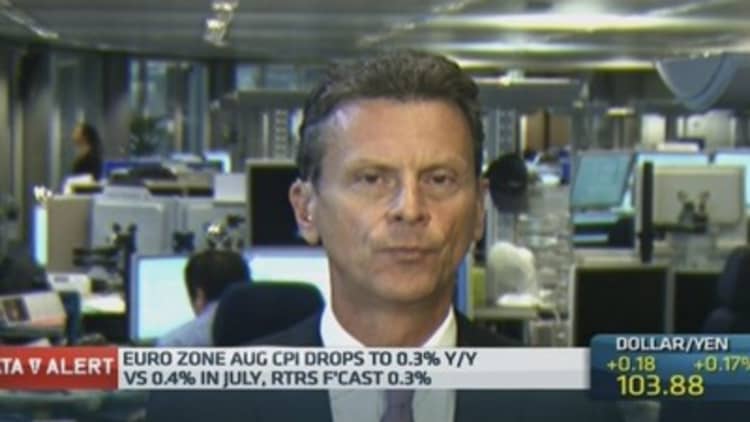
Euro zone inflation continued to fall in August, boosting expectations that the European Central Bank (ECB) will try bolster the region's economy by announcing further stimulus measures – perhaps as early as Thursday.
Consumer prices rose by just 0.3 percent year-on-year in August, according to official figures released by Eurostat Friday, meeting expectations but marking a fresh five-year low. This is down from 0.4 percent in July, and is significantly below the central bank's target of just below 2 percent.
Separate data revealed that the rate of unemployment in the euro zone remained stubbornly high in July, at 11.5 percent, unchanged from June.
Read MoreEuro zone yields turn negative on Draghi hopes
The inflation data come at a key time for the ECB, just days ahead of its next policy meeting on Thursday.
ECB President Mario Draghi hinted at further stimulus measures in a speech in Jackson Hole last week, where he acknowledged that inflation expectations had been falling and said the ECB, "within its mandate, will use all of the available instruments needed to ensure price stability over the medium term."
Broader economic data for the euro zone has also continued to surprise on the downside.
The closely-watched composite Purchasing Managers' Index (PMI) – which measures business activity in the euro zone - slipped in August, coming in below forecasts. In addition, official figures revealed that economic growth in the region was stagnant in the second quarter, with gross domestic product (GDP) flat, below analysts' expectations.
Read MoreEurozone business activity slips, missing forecasts
Concerns about the region's economic strength led the ECB to unveil a host of measures at its June meeting designed to give the euro zone's recovery a boost. Now, a growing number of economists expect the central bank to announce further easing on Thursday, with some arguing that a bond-buying – or quantitative easing (QE) – program will be announced in the coming months.
Read MoreEuropean bank officials weigh QE 'shock and awe'
Riccardo Barbieri, chief European economist at Mizuho International, said August's inflation print "isn't a game changer" because the ECB will have expected this figure.
"I don't think it puts them under huge pressure to announce something stunning immediately, but they're obviously under pressure to do more," he told CNBC after the data were released. "Ultimately, they have to move to QE, and this may well happen before the end of the year." He added that he expects the central bank to announce a program to buy asset-backed securities (ABS) on Thursday.
Read MoreGerman inflation steady as ECB action eyed
BNP Paribas economists, meanwhile, argued thatABS purchases were "not yet ready for launch". Earlier this week, the ECB said it had hired BlackRock Solutions to help it prepare the program.
Instead, they expect the ECB to cut its refinancing and deposit rates by 10 basis points, as "failure to take action would likely exacerbate the recent fall in euro zone inflation expectations".
However, Jennifer McKeown, senior European economist at Capital Economics, does not expect any definitive action from the ECB on Thursday, although she added that the inflation data "should encourage the ECB to offer stronger hints of additional policy support to come after its meeting."
"In all, there is plenty of ammunition here for the doves on the ECB's Governing Council to argue for more policy support. While the bank is unlikely to act at its meeting next week, it is likely to hint that quantitative easing is firmly on the table," she said in a note on Friday.
—By CNBC's Katrina Bishop


